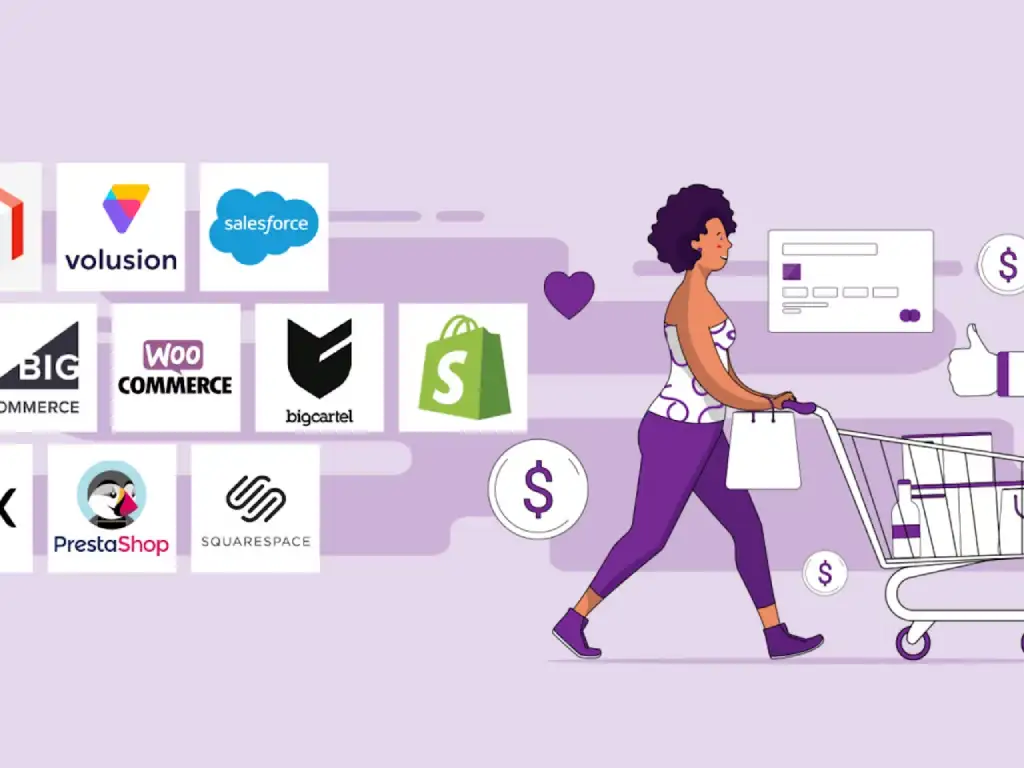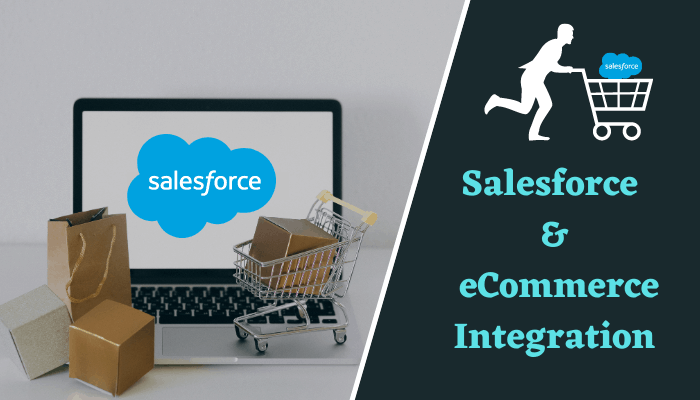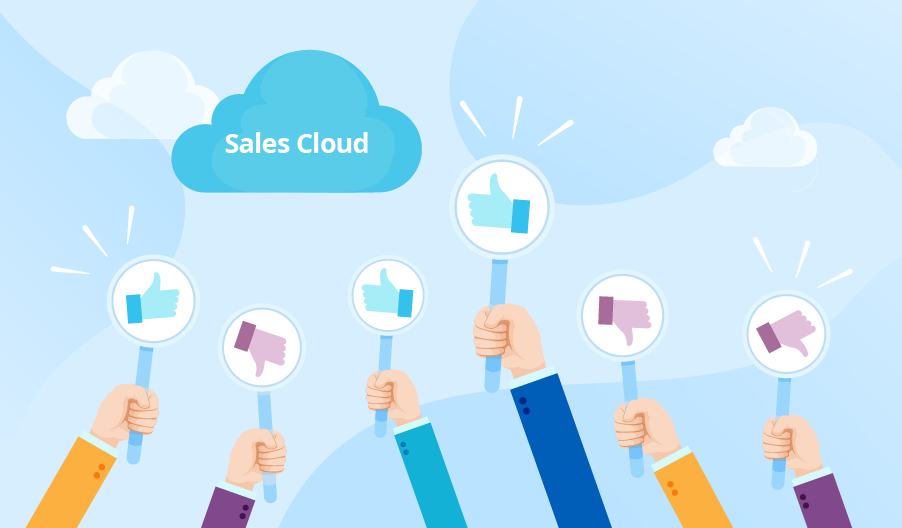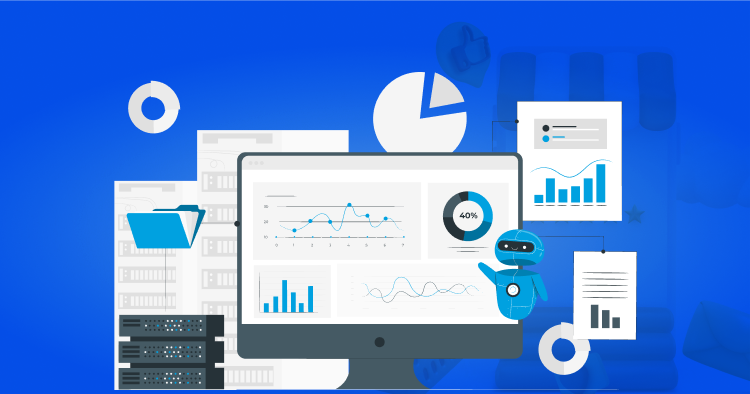Have you been looking for ways to integrate salesforce with your existing ecommerce platforms? Continue to read as we bring you everything you need to know about ecommerce integration with salesforce and what may be the best option for you.
Introduction

Ecommerce and Customer Relationship Management (CRM) are crucially interlinked. The two close relatives often go hand in hand to enable ecommerce businesses to improve their ROIs.
Questions about scaling commerce? Read this article Salesforce eCommerce integration and What is Salesforce Commerce Cloud Pricing? The Ultimate guide to having a better understanding of the topic.
Now, when we talk about ecommerce and CRM integration, Salesforce is by far the most widely implemented system for ecommerce platforms.
In fact, ecommerce integration with salesforce is something that is considered essential to achieve better store management, improved user experience, and higher revenues.
That’s understandable given the robust functionalities and features offered by Salesforce for ecommerce businesses.
Now, if you, too, have been wondering about ecommerce integration with salesforce and the most efficient approach for the process, you are on the right platform.
Below, we will be discussing multiple ways for ecommerce integration with salesforce and what’s the best approach for your business.
Read about top Salesforce trends that will help businesses keep up with all the latest Salesforce future developments
So, let’s get started…
Questions? Ask about Salesforce Commerce Cloud implementation, or anything else. Also, Read this Guide What Is Salesforce Commerce Cloud
The Problem Statement
Ironically, the problem statement isn’t about if ecommerce integration with salesforce is possible (it is widely integrated), but what’s the best way for ecommerce integration with salesforce.
Read this article to know which one is superior: Salesforce Commerce Cloud Vs Salesforce Marketing Cloud
Now, you may be running a BigCommerce web design company and thereby more concerned about salesforce commerce cloud integration with BigCommerce stores or WooCommerce Stores, Magento stores, and so on and so forth.
Honestly, whether you are looking for salesforce WooCommerce integration or Salesforce B2B commerce integration, there is nothing that can’t be achieved. The only issue is to choose the best option for the integration process.
So, without wasting more time, let’s simply move on and see the two best ways for ecommerce integration with salesforce.
Compare the similarities and differences between Salesforce Commerce Cloud vs Demandware
Ways to Integrate Salesforce with Ecommerce
While there may be more ways to achieve ecommerce integration with salesforce, for the sake of this blog, we will be discussing two of the most widely implemented approaches, including;
- Using third-party plugins for ecommerce integration with salesforce
- Using salesforce commerce cloud development services to achieve ecommerce integration with salesforce.
There is another popular technique, but more on that in the section below. For now, let’s see some details into these two widely implemented techniques for ecommerce integration with salesforce.
You might also want to read: Benefits of using eCommerce Site Migration
–Third-party Plugins for e-commerce integration with Salesforce
If you currently have an ecommerce platform (Shopify, Magento, WooCommerce, or others), you can connect it to Salesforce CRM using third-party connectors. Salesforce also has a free CRM option, however the integration capabilities may vary by plan.
While such connectors are thought of as the fastest route for ecommerce integration with salesforce, there are some limitations attached to it.
For instance, not all connectors are created equal and ecommerce stores may face data synchronization issues between two platforms.
For instance, some connectors may not support two-way data synchronization, whereas, others may only sync with ecommerce products. Similarly, some connectors may create troubles when you are looking to scale your store.
That’s why, if you decide to go with third-party connectors for ecommerce integration with salesforce, make sure you choose a reliable vendor who got the knowledge, experience, and expertise to deliver you a custom salesforce connector for your ecommerce business.
At Folio3, our custom salesforce ecommerce integration connectors offer businesses a simple, streamlined, and reliable solution to connect their ecommerce stores with powerful functionalities of Salesforce CRM without any hassle.
Read this article to know which one is superior: Salesforce Commerce Cloud Vs Salesforce Marketing Cloud
–Salesforce Commerce Cloud
Apart from third-party connectors, the salesforce commerce cloud is the other highly viable and widely implemented solution for ecommerce integration with salesforce.
Since the solution is developed by salesforce, it comes packed with B2B and B2C features and functionalities, like order management, order fulfillment, omnichannel selling, and much more.
Compare the similarities and differences between Salesforce Commerce Cloud vs Demandware
While the platform offers an easy integration solution, you can still hire a professional to ensure accuracy and hassle-free integration.
With the right salesforce B2C commerce developer, you will be able to have a unified and robust platform to view everything you need to know about your customers.
Another benefit of going with the salesforce commerce cloud is its compatibility with other salesforce products that augment the ecommerce store’s capabilities to streamline sales, customer experience, and marketing efforts.
You might also want to read: Salesforce Merchandising
For instance, you can greatly improve the synchronization and outcome of sales and support teams by connecting the commerce cloud with the sales cloud.
The integration will enable the sales dept. to have a better understanding of the customers’ purchasing behavior, pinning customer experience issues, and more. All in all, the integration will enable sales and support teams to offer personalized services for a better customer experience.
Read Also Integrate Klaviyo with Shopify
The one downside of Salesforce commerce cloud integration is the rigidity of the platform. It is worth mentioning that “salesforce commerce cloud was acquired by the company from “Demandware”” back in 2016.
This is still a large monolithic commerce platform that comes with certain scalability and technical issues.
Which Option Would Be the Best for You?
Honestly, the best option would depend on your ecommerce needs and preference. If you believe you got the right in-house expertise to handle the rigid salesforce commerce cloud platform then you may decide to go with it.
Explore the complete Salesforce 360
However, here you may need constant support from a professional salesforce commerce cloud consultant to ensure seamless operations and access to data.
Alternatively, going with third-party ecommerce integration with salesforce connectors is the best option for stores looking for quick, reliable, and scalable solutions.
At Folio3, we offer customized salesforce integration connectors for individual ecommerce stores, including WooCommerce – Salesforce integration, BigCommerce – Salesforce integration, Magento – Salesforce integration, and much more.
Since third-party connectors are custom build to achieve better integration and seamless data flow between two systems, stores can leverage optimum data accessibility and integration to improve their sales and ROIs.
You might also want to read: Salesforce Commerce Cloud Benefits
Also, by going with salesforce connectors, you leverage the expertise and experience of professional consultants and developers to ensure a hassle-free and seamless integration solution.
Final Words
Well, we are highly confident that by now you must have learned a lot about ecommerce integration with salesforce and how you can choose the best approach.
To summarize, third-party plugins may be the best integration option if you have an existing ecommerce platform and looking to scale it by leveraging the powerful features of salesforce.
However, make sure you choose an experienced vendor to avoid data synchronization issues.
Alternatively, you can go with the salesforce commerce cloud to integrate ecommerce platforms.
Since the commerce cloud is offered by salesforce itself, you can rely on the security and integration performance of the solution. However, you may face scalability and technical issues.
Get in touch with our sales representatives to know more about Folio3’s dedicated and robust ecommerce – salesforce integration connectors and how we can help you streamline the data flow between two systems without any glitches.
You Might Want To Read These Articles:
1) Salesforce Commerce Cloud B2B Vs B2C
2) Salesforce Commerce Cloud integration
3) Salesforce Commerce Cloud for online business
4) Magento vs Salesforce Commerce Cloud
5) Salesforce B2B Commerce Cloud
6) Salesforce Commerce Cloud Implementation Guide
FAQs:
How does Salesforce integrate with ecommerce?
There are multiple ways to integrate ecommerce platforms with salesforce. The two most widely used methods include using third-party integration connectors or using the salesforce commerce cloud.
Does Salesforce support ecommerce?
Yes. Just like salesforce is a leading CRM solution that brings in robust features and functionalities for ecommerce businesses. Similarly, the salesforce commerce cloud is a powerful platform to offer unified ecommerce experiences.
The platform is developed to support ecommerce platforms to get the most out of their online presence across all digital platforms, including mobile, desktop, and social platforms.
Can we create an ecommerce website using Salesforce?
Yes. While it may not be obvious but as the largest cloud computing company, salesforce brings powerful features and tools to support ecommerce websites. For instance, you can register a domain (well a subdomain actually) with “force.com”.
Also, you can find everything you will need to create a functional ecommerce website in salesforce (disguised as “Visualforce” and “Apex”). Also, there are plenty of aesthetically pleasing and functional templates to get started with your store design.
What is the Salesforce commerce platform?
Salesforce commerce platform is a powerful and leading cloud-based solution for ecommerce stores.
The platform essentially links ecommerce stores with Salesforce CRM, enabling them to capitalize on advanced functionalities for sales, marketing, customer support, and more to achieve higher ROIs.








